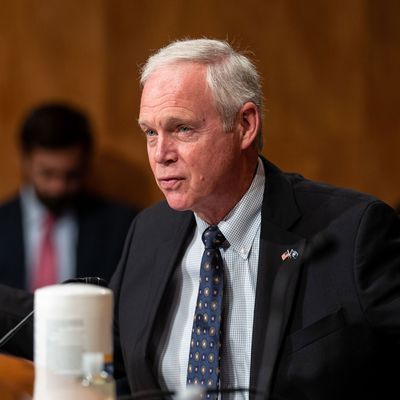
One of the last major shoes to drop in setting up the landscape for the 2022 midterm Senate elections is apparently on its way in Wisconsin. The Milwaukee Journal-Sentinel (among other news outlets) is reporting that two-term Republican incumbent Ron Johnson has decided to run and will make his formal announcement very soon:
Johnson has drawn out his decision-making for months even as a large field of Democrats assembled to take him on in the midterms. By running, the Oshkosh Republican will be breaking a past campaign pledge to serve only two terms.
Entering 2022 the equally-divided Senate (Vice President Kamala Harris broke the tie that enabled Democrats to control the chamber) is very much up for grabs. The Cook Political Report rates six races as tossups: Johnson’s Wisconsin seat plus open Republican seats in North Carolina and Pennsylvania; and seats held by Democrats Mark Kelly of Arizona, Raphael Warnock of Georgia, and Catherine Cortez Masto of Nevada.
Johnson will be a major target for Democrats. To put it simply, he’s not the sort of lawmaker that battleground states tend to elect and then keep reelecting. He’s sort of a cross between a local chamber of commerce president whose views of government and fiscal policy were formed in the 1950s, and a right-wing talk show host in a very small market. He’s seamlessly made the transition from being a classic throw-the-bums-out Tea Party candidate when first elected in 2010, to becoming a MAGA crank today. As the New Republic’s Daniel Strauss explains in a recent profile of Johnson, the senator is the “perfect encapsulation of the type of Republican who dives deep into misinformation and debunked science.”
In mid-November, the senator’s YouTube page was, for the second time, temporarily suspended for violating the website’s rules on spreading misinformation about COVID. During the coronavirus pandemic, he has been one of the most high-ranking officials in Congress to elevate and push conspiracy theories about vaccines. He’s floated that Ivermectin was being suppressed in order to help boost pricier drugs with the same benefits. He’s pushed hydroxychloroquine as a viable alternative to Covid vaccines.
Johnson has also dismissed climate change as “bullshit.” And he’s been an eager proponent of misinformation about the 2020 elections, while hailing the Trump supporting who came to Washington last January 6 as “people that love this country, that truly respect law enforcement, [and] would never do anything to break the law.” He also hasn’t lost his old fiscal curmudgeon views, either; he was a bitter opponent of Biden’s popular 2021 stimulus bill on grounds it increased budget deficits.
But he’s not a pol who should be underestimated. In 2016 he was all but left for dead by many Republican groups (including the Senate Republican fundraising committee and a PAC closely tied to the Koch brothers) when he badly trailed former senator Russ Feingold in polls for their rematch of the race Johnson won in an upset in 2010. His anti-politician shtick still seems to work under the right circumstances.
Johnson has also, however, arguably been lucky. As noted 2010 was an ideal cycle for someone like this novice candidate with a business background. And in 2016, when he beat Feingold again, Wisconsin was experiencing the sudden rightward tilt that gave this state to a Republican presidential candidate (Trump, of course) for the first time in 32 years. And now it’s likely Johnson will again run in a favorable election year for Republicans. But it’s unclear this deeply polarized state full of highly motivated voters will be typical of the country.
Certainly the field of viable Democrats competing to oppose Johnson (notably Lieutenant Governor Mandela Barnes; state Treasurer Sarah Godlewski; Milwaukee Bucks senior vice president Alex Lasry; and Outagamie County Executive Tom Nelson) indicates some confidence his time is finally up. And his act may be wearing thin on voters. A November 2021 poll by the respected Marquette Law School outfit placed Johnson’s favorability ratio underwater at 36-42, and gave him a reelect number of only 38 percent.
It’s possible that Johnson’s race could be overshadowed by a red-hot gubernatorial contest with potentially big implications for how the 2024 election is run (and the results tabulated) in Wisconsin. Incumbent Democrat Tony Evers is being challenged by Republican former Lieutenant Governor Rebecca Kleefisch, who thought she might have the GOP primary to herself. But Johnson’s decision to run for a third term will likely bump rising-star Kevin Nicholson, who was eyeing a Senate race after running unsuccessfully for the upper chamber in 2018, into a challenge to Kleefisch. Meanwhile Donald Trump has encouraged former congressman Sean Duffy to enter the gubernatorial race.
But this is Wisconsin, where the one sure thing is that statewide races will be competitive, expensive, and often vicious. It’s not a bad environment for a loud and proud yahoo like Ron Johnson. As TNR’s Strauss notes, “Republicans privately roll their eyes at Johnson,” But they will go to the mats for him, and control of the Senate, along with Joe Biden’s ability to get his judicial and executive-branch nominees confirmed, may depend on whether Democrats can succeed where Feingold failed.






























